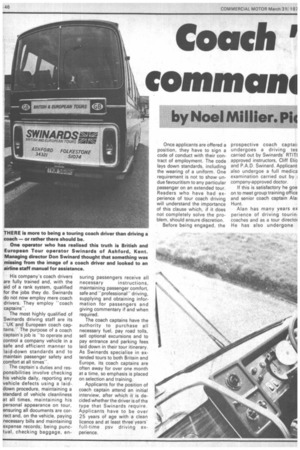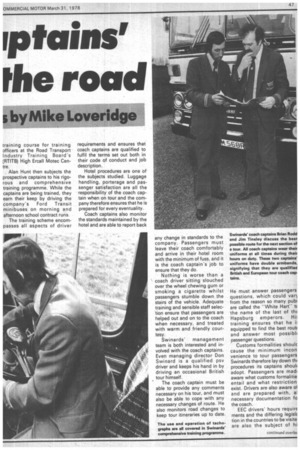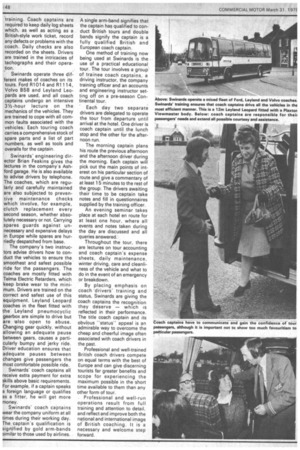Coach iptaine comm am the road
Page 38

Page 39

Page 40

If you've noticed an error in this article please click here to report it so we can fix it.
by Noel Milner. Pk s by Mike Loveridgel
THERE is more to being a touring coach driver than driving a coach — or rather there should be.
One operator who has realised this truth is British and European Tour operator Swinards of Ashford, Kent. Managing director Don Swinard thought that something was missing from the image of a coach driver and looked to an airline staff manual for assistance.
His company's coach drivers are fully trained and, with the aid of a rank system, qualified for the jobs they do. Swinards do not now employ mere coach drivers. They employ "coach captains-.
The most highly qualified of Swinards driving staff are its "1.11K and European coach captains.The purpose of a coach captain's job is "to operate and control a company vehicle in a safe and efficient manner to laid-down standards and to maintain passenger safety and comfort at all times".
The captain's duties and responsibilities involve checking his vehicle daily, reporting any vehicle defects using a laiddown procedure, maintaining a standard of vehicle cleanliness at all times, maintaining his personal appearance on tour, ensuring all documents are correct and, on the vehicle, paying necessary bills and maintaining expense records; being punctual, checking baggage, en
suring passengers receive all necessary instructions, maintaining passenger comfort, safe and "professional" driving, supplying and obtaining information for passengers and giving commentary if and when required.
The coach captains have the authority to purchase all necessary fuel, pay road tolls, sell optional excursions and to pay entrance and parking fees laid down in their tour itinerary. As Swinards specialise in extended tours to both Britain and Europe, its coach captains are often away for over one month at a time, so emphasis is placed on selection and training.
Applicants for the position of coach captain attend an initial interview, after which it is decided whether the driver is of the type that Swinards require. Applicants have to be over 25 years of age with a clean licence and at least three years' full-time psv driving experience. Once applicants are offered a position, they have to sign a code of conduct with their contract of employment. The code lays down standards, including the wearing of a uniform. One requirement is not to show undue favouritism to any particular passenger on an extended tour. Readers who have had experience of tour coach driving will understand the importance of this clause which, if it does not completely solve the problem, should ensure discretion.
Before being engaged, the prospective coach captai undergoes a driving tes carried out by Swinards' RTITI approved instructors, Cliff Elio and P.A.D. Swinard. Applicant also undergoe a full medic@ examination carried out by company-approved doctor.
If this is satisfactory he goe on to meet group training office and senior coach captain Ala Hunt.
Alan has many years ex perience of driving tourin coaches and as a tour directoi He has also undergone training course for training officers at the Road Transport Industry Training Board's (RTITB) High Ercall Motec Centre.
Alan Hunt then subjects the prospective captains to his rigorous and comprehensive training programme. While the captains are being trained, they earn their keep by driving the company's Ford Transit minibuses on morning and afternoon school contract runs.
The training scheme encompasses all aspects of driver requirements and ensures that coach captains are qualified to fulfil the terms set out both in their code of conduct and job description.
Hotel procedures are one of the subjects studied. Luggage handling, porterage and passenger satisfaction are all the responsibility of the coach captain when on tour and the company therefore ensures that he is prepared for every eventuality.
Coach captains also monitor the standards maintained by the hotel and are able to report back any change in standards to the company. Passengers must leave their coach comfortably and arrive in their hotel room with the minimum of fuss, and it is the coach captain's job to ensure that they do.
Nothing is worse than a coach driver sitting slouched over the wheel chewing gum or smoking a cigarette whilst passengers stumble down the stairs of the vehicle. Adequate training and sensible staff selection ensure that passengers are helped out and on to the coach when necessary, and treated with warm and friendly courtesy.
Swinards' management team is both interested and involved with the coach captains. Even managing director Don Swinard is a qualified psv driver and keeps his hand in by driving an occasional British tour himself.
The coach captain must be able to provide any comments necessary on his tour, and must also be able to cope with any necessary changes of route. He also monitors road changes to keep tour itineraries up to date. He must answer passengers questions, which could var from the reason so many pub: are called the "White Hart" tc the name of the last of thf Hapsburg emperors. Nil training ensures that he i! equipped to find the best rout( and answer most possibli passenger questions.
Customs formalities shoulc cause the minimum incon venience to tour passengers Swinards therefore lay down thi procedures its captains shouh adopt. Passengers are madi aware what customs formalitie entail and what restriction exist. Drivers are also aware ol and are prepared with, al necessary documentation to the coach.
EEC drivers' hours requirE ments and the differing legislz tion in the countries to be visite are also the subject of hi
training. Coach captains are required to keep daily log sheets which, as well as acting as a .British-style work ticket, record any defects or problems with the coach. Daily checks are also recorded on the sheets. Drivers are trained in the intricacies of tachographs and their operation.
Swinards operate three different makes of coaches on its tours. Ford R1014 and R1114, Volvo 958 and Leyland Leopards are used, and all coach captains undergo an intensive 31/2-hour lecture on the mechanics of the vehicles. They are trained to cope with all common faults associated with the vehicles. Each touring coach carries a comprehensive stock of spare parts and a list of part numbers, as well as tools and overalls for the captain.
Swinards' engineering director Brian Feakins gives the lectures in the company's Ashford garage. He is also available to advise drivers by telephone. The coaches, which are regularly and carefully maintained are also subjected to preventive maintenance checks which involve, for example, clutch replacement every second season, whether absolutely necessary or not. Carrying spares guards against unnecessary and expensive delays in Europe while spares are hurriedly despatched from base.
The company's two instructors advise drivers how to conduct the vehicles to ensure the smoothest and safest possible ride for the passengers. The coaches are mostly fitted with Telma Electric Retarders, which keep brake wear to the minimum. Drivers are trained on the correct and safest use of this equipment. Leyland Leopard coaches in the fleet fitted with the Leyland pneumocyclic gearbox are simple to drive but are also open to abuse. Changing gear quickly, without allowing an adequate pause between gears, causes a particularly bumpy and jerky ride. Driver education ensures that adequate pauses between changes give passengers the most comfortable possible ride.
Swinards' coach captains all receive extra payment for extra skills above basic requirements. For example, if a captain speaks a foreign language or qualifies as a fitter, he will get more money.
Swinards' coach captains wear the company uniform at all times during their working day. The captain's qualification is signified by gold arm-bands similar to those used by airlines. A single arm-band signifies that the captain has qualified to conduct British tours and double bands signify the captain is a fully qualified British and European coach captain.
One method of training now being used at Swinards is the use of a practical educational tour. The tour involves a group of trainee coach captains, a driving instructor, the company training officer and an accounts and engineering instructor setting oft on a pre-season Continental tour.
Each day two separate drivers are delegated to operate the tour from departure until arrival at the hotel. One driver is coach captain until the lunch stop and the other for the afternoon run.
The morning captain plans his route the previous afternoon and the afternoon driver during the morning. Each captain will pick out the main points of interest on his particular section of route and give a commentary of at least 15 minutes to the rest of the group. The drivers awaiting their time to be captain take notes and fill in questionnaires supplied by the training officer.
An evening seminar takes place at each hotel en route for at least one hour, where all events and notes taken during the day are discussed and all queries answered.
Throughout the tour, there are lectures on tour accounting and coach captain's expense sheets, daily maintenance, winter driving, care and cleanliness of the vehicle and what to do in the event of an emergency or breakdown.
By placing emphasis on coach drivers' training and status, Swinards are giving the coach captains the recognition they deserve — which is reflected in their performance. The title coach captain and its obvious "status" appeal is an admirable way to overcome the cheap and cheerful image often associated with coach drivers in the past.
Professional and well-trained British coach drivers compete on equal terms with the best of Europe and can give discerning tourists far greater benefits and scope for experiencing the maximum possible in the short time available to them than any other form of tour.
Professional and well-run operations result from full training and attention to detail, and reflect and improve both the national and international image of British coaching. It is a necessary and welcome step forward.






















































































































